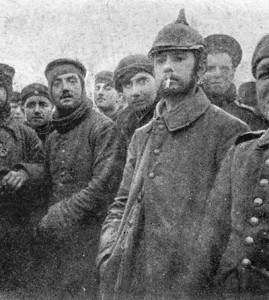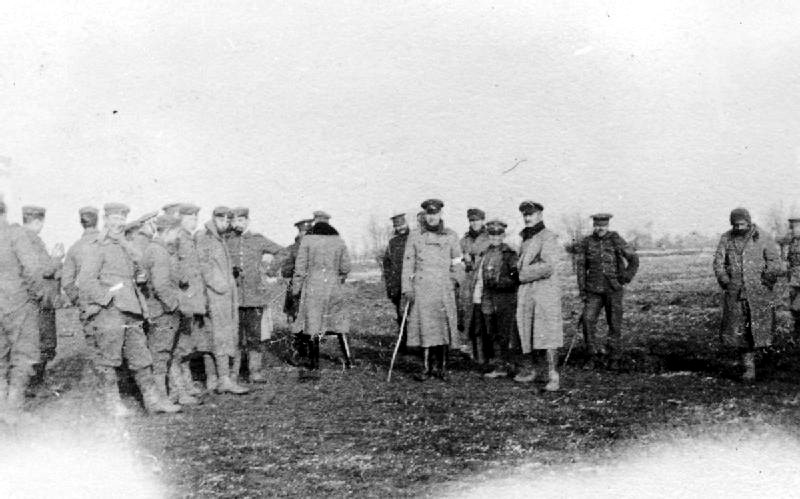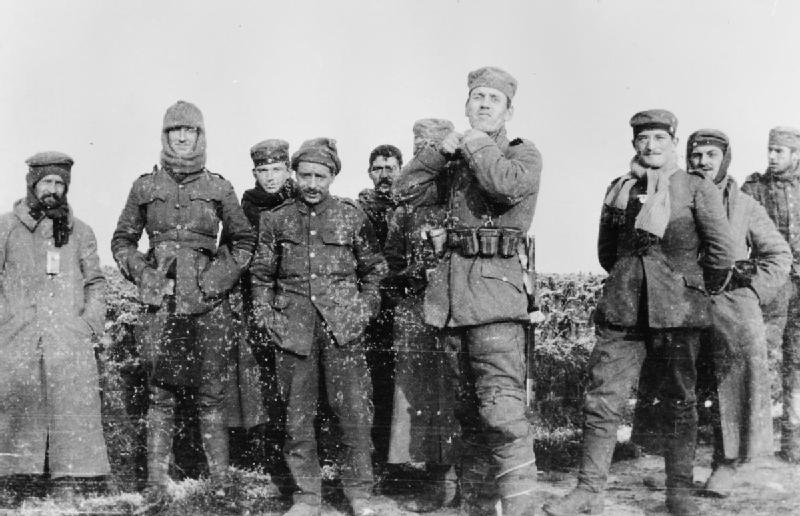The Best Christmas Ever
 German and British soldiers fraternize during the Christmas Truce of 1914.
German and British soldiers fraternize during the Christmas Truce of 1914. One hundred years ago, on the evening of December 24, 1914, a strange and wonderful event began to unfold.
German armies, who had planned to reach Paris forty-two days after the outbreak of World War I the previous August, faced entrenched British and French forces across a front that zigzagged from the North Sea to Switzerland. Both elaborate lines, sometimes only a few dozen yards apart, were virtually impregnable. Go-getters anxious to impress their superiors tried to develop ingenious tactics for inflicting mayhem more efficiently than their opponents could, but the average Fritz and Tommie in the trenches could see that they were likely to be there a long, long time.
In the preceding weeks there had been occasional instances of short truces to allow the retrieval of corpses from the “no-man’s land” separating the trenches, during which enemy soldiers occasionally spoke to each other in a cooperative spirit. These exchanges were enough to worry a British general, who issued an unequivocal order against fraternization: “Friendly intercourse with the enemy, unofficial armistices and the exchange of tobacco and other comforts, however tempting and occasionally amusing they may be, are absolutely prohibited.”

British and German troops meeting in No-Man’s Land during the unofficial truce. (British troops from the Northumberland Hussars, 7th Division, Bridoux-Rouge Banc Sector).
As night fell on Christmas Eve, Germans placed a number of brightly lit trees atop their trenches so the enemy troops could enjoy them as well (or perhaps so they would envy them). German carols like “Stille Nacht” could be clearly heard in the British trenches; the Brits began to respond with “Good King Wenceslas” and their own favorite songs.
It didn’t take long before brave or foolish enlisted men from both sides began venturing into no-man’s land, bearing a simple message: How about no more shooting tonight, or tomorrow, OK?
Many Germans knew a little English from summer jobs or other travel. In nearly all cases, the response was, “Yeah, we can do that. If the general shows up and makes us shoot, we’ll be sure to aim over your heads.” Long before Twitter, the world’s first flash-mob was born.
The 25th dawned sharply colder—with the marvelous benefit of freezing solid the sometimes knee-deep mud that men cursed even more than they did enemy fire. All up and down the British sector of the line, fellows who had been intent on killing each other twenty-four hours earlier climbed out of their trenches and drifted over toward enemy lines. Gifts were exchanged—schnapps, cigars, buttons, whatever they could lay their hands on. (Mass-produced canned plum puddings provided by His Majesty’s Government were an especially popular giveaway item from the Brits.)
At one point a rabbit was spotted, and laughing soldiers from both sides made a game of trying to catch it first. As the day wore on more organized sport developed, including at least one full-scale soccer match on what had to be the bumpiest field in the history of the game. After the war, regimental histories on both sides recorded the score as Germany 3, England 1.
Not everyone participated. French soldiers, defending their own invaded territory, were in less generous spirits. One German who refused to join the fun harrumphed, “Such a thing should not happen in wartime. Have you no German sense of honor at all?” Had Corporal Hitler been a little less grumpy that day, perhaps a lot of things might have turned out differently.

German soldiers of the 134th Saxon Regiment photographed with men of the 2nd Battalion Royal Dublin Fusiliers in No Man’s Land on the Western Front.
As the day drew to a close, some newfound friends began suggesting that the truce should extend through New Year’s Day—or even longer. Stanley Weintraub in Silent Night: The Story of the World War I Christmas Truce describes how the XIX Saxon Corps even went “on strike” the following day, telling their officers that the British were good fellows whom they didn’t want to shoot. “We spent that day and the next,” a sergeant later related, “trying to shoot the stars down from the sky.”
There was similar unrest among the British, but on both sides officers were able to defuse the peace-seeking threat without courts-martial or firing squads. Standard military practice was to rotate companies from front-line trenches back to reserve duty every few days. When people who had spent the 25th on reserve behind the lines rotated forward, they hadn’t developed any special fondness for their enemies to be overcome. And when it finally came the turn of those who had observed the truce to return to the front line, they faced active enemy fire, always a powerful stimulus to shooting back.
Still, the high commands took care not to permit such war-threatening conduct to occur on Christmases in subsequent years. In 1915, for example, the British scheduled an all-day artillery barrage for December 25 to make fraternization impossible.
What if those who wanted to extend the 1914 truce had succeeded? What if everyone just packed their bags and headed home? Speculating about alternative history is pointless, because there’s never a way to know. It’s hard to imagine, though, any alternate scenario worse than what did occur. Not just the fifteen million deaths (nearly 10,000 per day, every day), but also little side effects like the Bolshevik revolution, the European colonization of the Middle East, the worldwide flu pandemic of 1918, and fascism, to name a few.
How the war did finally end, though, bears some resemblance to the events of Christmas, 1914. In The Pity of War, Niall Ferguson relates that some 340,000 Germans voluntarily stopped fighting and gave themselves up as prisoners to the Allies in the final four months before the 1918 armistice, which is why the war ended so abruptly. Perhaps some of those who surrendered had spent Christmas, 1914 chasing rabbits with enemies who weren’t so bad once you got to know them. That’s the real humanist message of the Christmas truce: that each of us has the power to make our own decisions about how to live, the power to tell those in authority, “No, what you’re saying isn’t right—I’m going to do what makes sense to me.”
